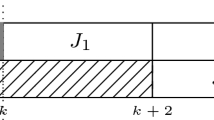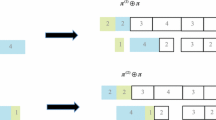Abstract
This paper systematically studies the two-machine flow-shop scheduling problems with no-wait and deterministic unavailable interval constraints. To minimize the makespan, three integer programming mathematical models are formulated for two-machine flow-shop with no-wait constraint, two-machine flow-shop with resumable unavailable interval constraint, and two-machine flow-shop with no-wait and non-resumable unavailable interval constraints problems, respectively. The optimal conditions of solving the two-machine flow-shop with no-wait constraint problem by the permutation schedules, the two-machine flow-shop with resumable unavailable interval constraint problem by the Johnson algorithm, and two-machine flow-shop with no-wait and non-resumable unavailable interval constraints problem by the Gilmore and Gomory Algorithm (GGA) are presented, respectively. And the tight worst-case performance bounds of Johnson and GGA algorithms for these problems are also proved to be 2. Several instances are generated to demonstrate the proposed theorems. Based on the experimental results, GGA obtains the optimal solution for the two-machine flow-shop with no-wait constraint problem. Although it cannot reach the optimal solution for the two-machine flow-shop with resumable unavailable interval constraint problem, the optimal gap is 0.18% on average when the number of jobs is 100. Moreover, under some special conditions, it yields the optimal solution for the two-machine flow-shop with no-wait and non-resumable unavailable interval constraints problem. Therefore, GGA is an efficient heuristic to solve these problems.
Similar content being viewed by others
References
Allaoui H, Artiba A, Elmaghraby S E, Riane F (2006). Scheduling of a two-machine flowshop with availability constraints on the first machine. International Journal of Production Economics 99(1–2): 16–27.
Allaoui Hamid, Artiba Abdel Hakim (2009). Johnson’s algorithm: A key to solve optimally or approximately flow shop scheduling problems with unavailability periods. International Journal of Production Economics 121(1): 81–87.
Allaoui H, Lamouri S, Artiba A, Aghezzaf E (2008). Simultaneously scheduling n jobs and the preventive maintenance on the two-machine flow shop to minimize the makespan. International Journal of Production Economics 112(1): 161–167.
Breit J (2004). An improved approximation algorithm for two-machine flow shop scheduling with an availability constraint. Information Processing Letters 90(6):273–278.
Cheng T C Edwin, Wang Guoqing (2000). Improved heuristic for two-machine flowshop scheduling with an availability constraint. Operations Research Letters 26(5): 223–229.
Chihaoui F, Kacem I, Hadj-Alouane A, Dridi N, Rezg N (2011). No-wait scheduling of a two-machine flow-shop to minimize the makespan under non-availability constraints and different release dates. International Journal of Production Research 49(21): 6273–6286.
Cui W, Lu Z, Zhou B, Li C, Han X (2018). A hybrid genetic algorithm for non-permutation flow shop scheduling problems with unavailability constraints. International Journal of Computer Integrated Manufacturing: 273–278.
Gao F, Liu M, Wang J, Lu Y (2018). No-wait two-machine permutation flow shop scheduling problem with learning effect, common due date and controllable job processing times. International Journal of Production Research 56(6): 2361–2369.
Gilmore P C, Gomory R E (1964). Sequencing a one-state variable machine: A solvable case of the traveling salesman problem. Operations Research 12: 655–679.
Grabowski Józef, Pempera Jarosław (2005). Some local search algorithms for no-wait flow-shop problem with makespan criterion. Computers & Operations Research 32(8): 2197–2212.
Hadda Hatem (2012). A polynomial-time approximation scheme for the two machine flow shop problem with several availability constraints. Optimization Letters 6(3): 559–569.
Hadda Hatem, Dridi Najoua, Hajri-Gabouj Sonia (2010). An improved heuristic for two-machine flow shop scheduling with an availability constraint and nonresumable jobs. 4OR 8(1): 87–99.
Joo B J, Kim Y D (2009). A branch-and-bound algorithm for a two-machine flowshop scheduling problem with limited waiting time constraints. Journal of the Operational Research Society 60(4): 572–582.
Kubzin Mikhail A, Strusevich Vitaly A (2004). Two-machine flow shop no-wait scheduling with a nonavailability interval. Naval Research Logistics 51(4): 613–631.
Lee C Y (1997). Minimizing the makespan in the two-machine flowshop scheduling problem with an availability constraint. Operations Research Letters 20(3): 129–139.
Lee C Y (1997). Two-machine flowshop scheduling with availability constraints. European Journal of Operational Research 114(2): 420–429.
Li Debiao, Chen Kejia, Wang Xiao (2017). Properties of two-machine no-wait flow-shop scheduling with a nonresumable unavailable interval. Journal of Industrial and Production Engineering 34(3): 232–238.
Su Ling Huey (2003). A hybrid two-stage flowshop with limited waiting time constraints. Computers & Industrial Engineering 44(3): 409–424.
Su Ling Huey, Lee Yuan Yu (2008). The two-machine flow-shop no-wait scheduling problem with a single server to minimize the total completion time. Computers & Operations Research 35(9): 2952–2963.
Wang Xiuli, Cheng T C Edwin (2007). An approximation scheme for two-machine flowshop scheduling with setup times and an availability constraint. Computers & Operations Research 34(10): 2894–2901.
Yang Dar Li, Hsub Chou Jung, Kuo Wen Hung (2008). A two-machine flowshop scheduling problem with a separated maintenance constraint. Computers & Operations Research 35(3): 876–883.
Zhao Chuanli, Tang Hengyong (2011). A note on two-machine no-wait flow shop scheduling with deteriorating jobs and machine availability constraints. Optimization Letters 5(1): 183–190.
Acknowledgments
We appreciate the editors and anonymous reviewers for their constructive and valuable suggestions and comments. This work was supported in part by the National Natural Science Foundation of China (NSFC) under Grant No. 71801051.
Author information
Authors and Affiliations
Corresponding author
Additional information
Kejia Chen received his Ph.D. degree in industrial and systems engineering from The Hong Kong Polytechnic University in 2007. His research interests include production management and operations research. He has published more than 90 papers in technical journals and conference proceedings. He is currently a Professor in School of Economics and Management, Fuzhou University, China.
Debiao Li received the Ph.D. degree in system science from The State University of New York at Binghamton, Binghamton, NY, USA, in 2015. He is currently an associate professor in School of Economics and Management, Fuzhou University, Fuzhou, China. His current research interests include scheduling and operations management.
Xiao Wang is a master student of Management Science in School of Economics and Management, Fuzhou University, China. She received BS Degree from the China University of Mining and Technology in 2009. Her research interests include production management and operations research.
Rights and permissions
About this article
Cite this article
Chen, K., Li, D. & Wang, X. Makespan Minimization in Two-Machine Flow-Shop Scheduling under No-wait and Deterministic Unavailable Interval Constraints. J. Syst. Sci. Syst. Eng. 29, 400–411 (2020). https://doi.org/10.1007/s11518-020-5456-2
Published:
Issue Date:
DOI: https://doi.org/10.1007/s11518-020-5456-2




